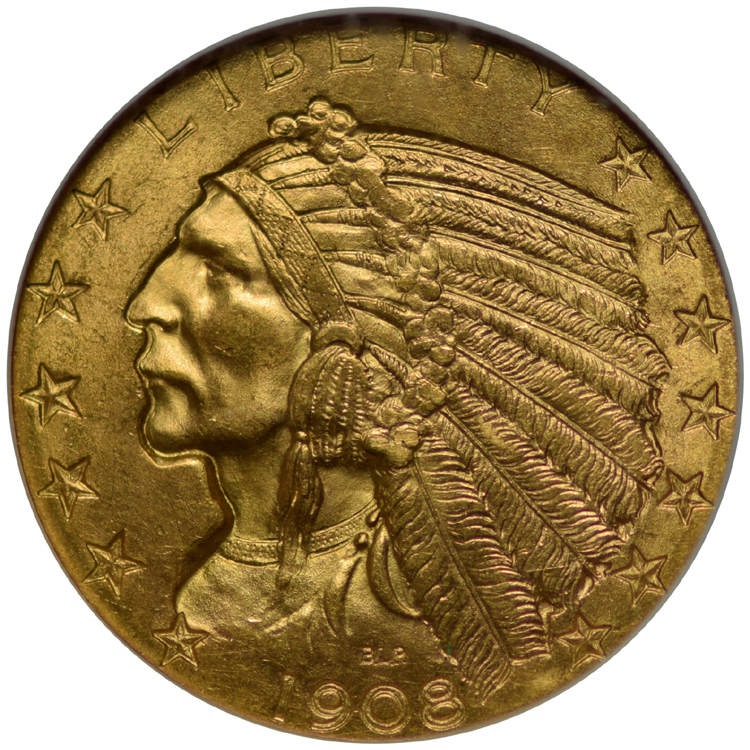$5 Indian Gold Half Eagles


| Quantity | Price per coin |
|---|---|
| 1-9 | |
| 10-19 | |
| 20-39 | |
| 40+ | |
Prices, availability subject to change.
Where applicable and unless specified,
NGC or PCGS and dates/mints our choice.
See Terms & Conditions.
Click for Interactive Chart
Buying $5 Indian Half Eagle Gold Coins
$5 Indian Half Eagle gold coins were minted each year from 1908 through 1916, and then again in 1929. With their unusual incuse design and rich history, they are a fascinating and largely overlooked member of the classic US gold coin family, deserving of a place in every gold coin collection and portfolio.
Extremely scarce in the higher Mint State grades, $5 Indians have the potential to appreciate quickly in a sharply rising gold market. Yet they are trading today at remarkably low prices. We think they are real sleepers!
Unique "incuse" gold coins
Along with their $2.50 Indian Quarter Eagle counterparts, $5 Indian Half Eagles are unique among all U.S. gold coins because of their "incuse" design. Whereas other coins are struck in "bas relief," meaning their designs are raised above the fields, these Indian gold coins have their designs engraved into their fields.
When the new Indian gold coins entered circulation in 1908, they were met with surprising criticism. Some critics thought they could be easily counterfeited by carving into blanks of metal. Some found the Native American on the obverse to look emaciated and unhealthy. Oddest of all was the contention that the incuse design would spread disease by capturing germs!
New gold coin designs
In 1904, when Teddy Roosevelt decided to remake all U.S. gold coins on classical models, he called upon famed sculptor Augustus Saint-Gaudens to create the innovative designs. Saint-Gaudens produced the gorgeous $20 "High Relief" Double Eagle that bears his name, and the classic $10 Indian Half Eagle gold coin.
Turning its attention $5 and $2.50 gold coins, the Mint planned to use Saint-Gaudens's design but were unable to find the room for the required inscriptions on the smaller coins. Roosevelt then asked Boston sculptor Bela Lyon Pratt to redesign the Half Eagle and Quarter Eagle while keeping the Native American theme.
Instead of the idealized female Liberty with headdress featured on the Saint-Gaudens $10 Indian, Lyon Pratt chose to depict a realistic male Native American on the obverse. The reverse, carrying over Saint-Gaudens' design from the $10 Indian gold coin, features a bald eagle clutching a bundle of olive branches. This eagle image was drawn from Roosevelt's inauguration medal, itself inspired by ancient Egyptian coinage.
| Minted: | 1908-1916, 1929 |
| Content: | .2419 oz gold |
| Purity: | .900 fine |
| Diameter: | 20.5 mm |
| Thickness: | 1.4 mm |
| Designer: | Bela Lyon Pratt |
| Grade | Certified Population | Lowest Price |
|---|---|---|
| MS65 | 1,720 |
$8,520 |
| MS64 | 18,728 |
$1,910 |
| MS63 | 52,268 |
$1,350 |
| MS62 | 91,991 |
$1,230 |
| AU | -- |
$1,175 |
| XF | -- |
$1,155 |
Certified Population = PCGS + NGC, 1/20/2025. | ||
